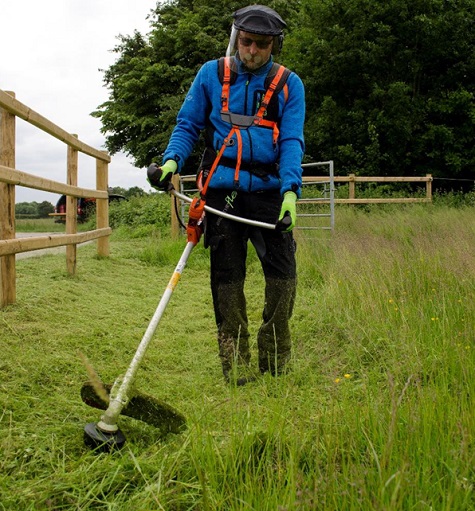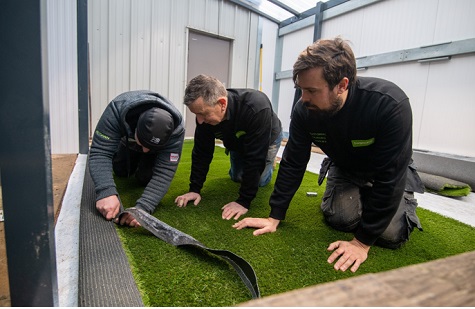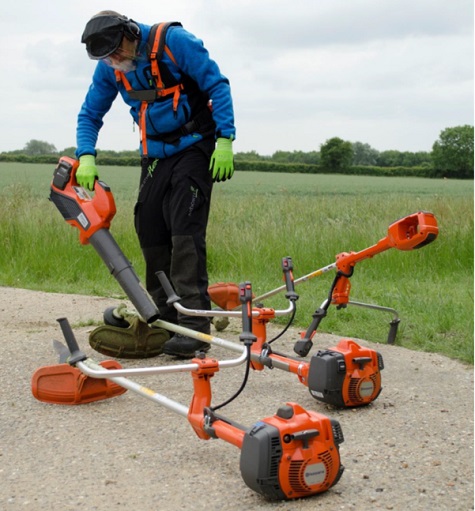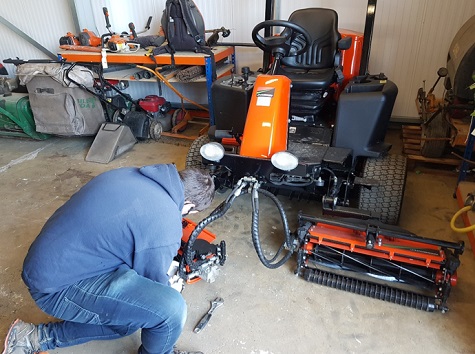Turf Pro editor Laurence Gale writes:
Having worked in the sports turf and amenity industry for well over 50 years, I believe I am well qualified to state that having the right training and education opportunities goes a long way to helping develop successful practitioners and managers in this wonderful, diverse industry.
I myself completed many education programmes; firstly receiving City and Guilds qualifications as part of a parks apprenticeship scheme at Birmingham City Council, followed by a number management courses including a BASIS Professional Register qualification that allows me to give advice on pesticides and plant nutrition. In 2003, I completed a Master’s Degree at Cranfield University and more recently acquired some Lantra NPTC PA1 PA6 and stem injection courses.
Undertaking relevant training and education courses are crucial to keep up with our ever-changing industry. Today we are reliant on machinery and technology advances to help us be more efficient and successful in delivering the high-quality playing surfaces and facilities we offer.

As mentioned in previous articles, one of the key issues facing the industry today is the need to recruit new people into the industry. We must ensure we can encourage this by developing skills and experiences.
Today’s modern practitioners require many attributes to do their job efficiently with the industry heavily reliant on machinery and effective data analysis, plus the use of new technologies, it is important we have the relevant training courses on offer.
One such training provider who also must keep up with this developing sports turf industry is Lantra who are one of the leading awarding bodies for land-based industries in both the UK and the Republic of Ireland.
Effectively they are a one-stop-shop and one of the only awarding organisations that can lead you from entry level training right through to expert user qualifications.
For over 40 years they have built up a reputation of delivering a wide range of courses that include forestry, horticulture, sports turf, agriculture, landscape and amenity.
These courses include a mix of training only and assessed training options and are packed with practical skills and technical content to help you develop and succeed in your career.
I managed to catch up with David Fisher, Lantra’s head of industry partnerships - agriculture and horticulture, to find out how the company had been coping throughout the pandemic and what thoughts he had on how to entice new blood into our industry.

David Fisher
David, when did you join the company, what is your role and what are the aims of Lantra?
I joined Lantra in October 2014 spending the first 4 years working as a training and qualifications product development manager for areas of landscaping and agriculture. Since 2019 my role has progressed into being more outward focused working with industry associations, training organisations and employers to highlight new opportunities and raise awareness and engagement with Lantra’s training and qualifications as head of industry partnerships. My work is supported by colleagues who work with industry experts to develop the training and qualifications to meet identified needs.
How have Lantra coped throughout the pandemic?
During the pandemic Lantra developed a large number of courses that were delivered remotely online via e-learning in preparation for learners to assessed practically when restrictions allowed. Some of these have been retained as ‘blended learning’ which has proved popular to reduce learners’ time way from the workplace. Staff worked from home wherever possible, with the office only used by those whose job roles necessitated it and all external visits were postponed.
Due to the occupations our training supports and safety critical aspects of machinery operation and pesticides spraying, Lantra’s training and qualifications were allowed to be delivered to ensure operators remained safe in the workplace.
When restrictions allowed, all training was done with enhanced safety protocols initially with reduced numbers to ensure risks were minimised. We are now back to pre-COVID activity and were pleased with how quickly levels of training resumed.
You say you are a one shop stop for training, how does that work in practice?
Lantra prides itself on learners being able to progress with us in their chosen industry from entry level training right through to technical expert qualifications. We offer underpinning non-assessed training in areas including chainsaws and pesticides ahead of nationally recognised licence to practice qualification assessments. Being able to offer both the training and recognised qualifications is something our providers really value.

How many courses or qualifications do you deliver on an annual basis?
Across the range of sectors Lantra covers, we’ve seen a steady increase in Lantra courses delivered. We have trained over 100,000 learners in the last 12 months with over 10,000 being directly linked to the landscaping sector.
Delivery of Lantra’s recognised pesticides qualifications have really grown in the past couple of years with well in excess of 3,000 learners during 2021.
What are your most popular courses?
The most popular courses are linked to practical job roles across landscaping and agriculture. Where certificates of competence are required to work or operate machines, Lantra’s recognised training and qualifications across chainsaws, pesticides, landscape and agricultural machinery are popular to ensure operatives know industry best practice to work safely. These include courses on the safe use of brushcutters, handheld pesticides application and chainsaw maintenance and cross-cutting.

How long does it take you to research, develop and deliver a new Lantra course?
Depending on the industry subject, the development of a new course can take anything from 6 months to in excess of a year. We have internal procedures working with industry to ensure what we commit to deliver is right for both people working in the sector and for Lantra compared to what already exists within our course portfolio.
Once approval is gained from our product development group, we work with industry experts to agree timescales and write the content and supporting materials. Part of this process is recruiting and standardising trainers and training providers to ensure there is a delivery network when launching to market.
What organisations and partners do you work with to deliver these courses and does having a strong connection with educational establishments help you deliver your courses?
Lantra has a network of training providers throughout the UK and Ireland who are approved to deliver training and qualifications to the agreed specifications of Lantra. These are a mixture of small and large training centres and well known colleges / universities like Harper Adams who service a range of learner types. It is important to Lantra that the training partners we work with are well respected and uphold the Lantra quality standard.

How many instructors and assessors do you have on your books?
Lantra has around 876 instructor / assessors across Lantra’s training and qualification suite, of which 257 are able to deliver landscaping related training and assessments. This enables us to be able to cover most parts of the UK and Ireland to meet the training needs of industry.
We currently have a shortage of youngsters wanting to come into our industry - do you see that at Lantra?
We have heard so through feedback and seen that ourselves through learner demographics and within our network of trainers. The interest is there, collectively as industry need to ensure careers and progression routes are clear and well publicised.
Do you think we as an industry have a recruitment problem?
Evidence would suggest there is currently, with the average age of operatives increasing and the issue of skills and knowledge being lost as people retire or leave the industry. The sector needs to work together to promote the benefits of joining and reasons to stay in the industry.
Do you think Lantra could help solve this problem?
Lantra and other industry organisations can help by promoting routes into industry through relevant training and apprenticeship frameworks, but also by highlighting progression routes so younger people understand that they can have a career in the industry. A greater use of technology in upskilling people through online or blended learning could also help. Lantra is currently carrying out work with industry partners to better understand and support careers across land-based sectors and will be providing more access to a wider range of courses.

What new courses in your opinion would encourage new blood to come into the industry?
Lantra has received feedback that progression routes and careers need to be publicised to make the industry more attractive. Access to skills needed to meet the changing requirements for future sector job roles. More use of emerging technology, ways to work more sustainably, team working / people skills and project management have been highlighted.
Thank you.